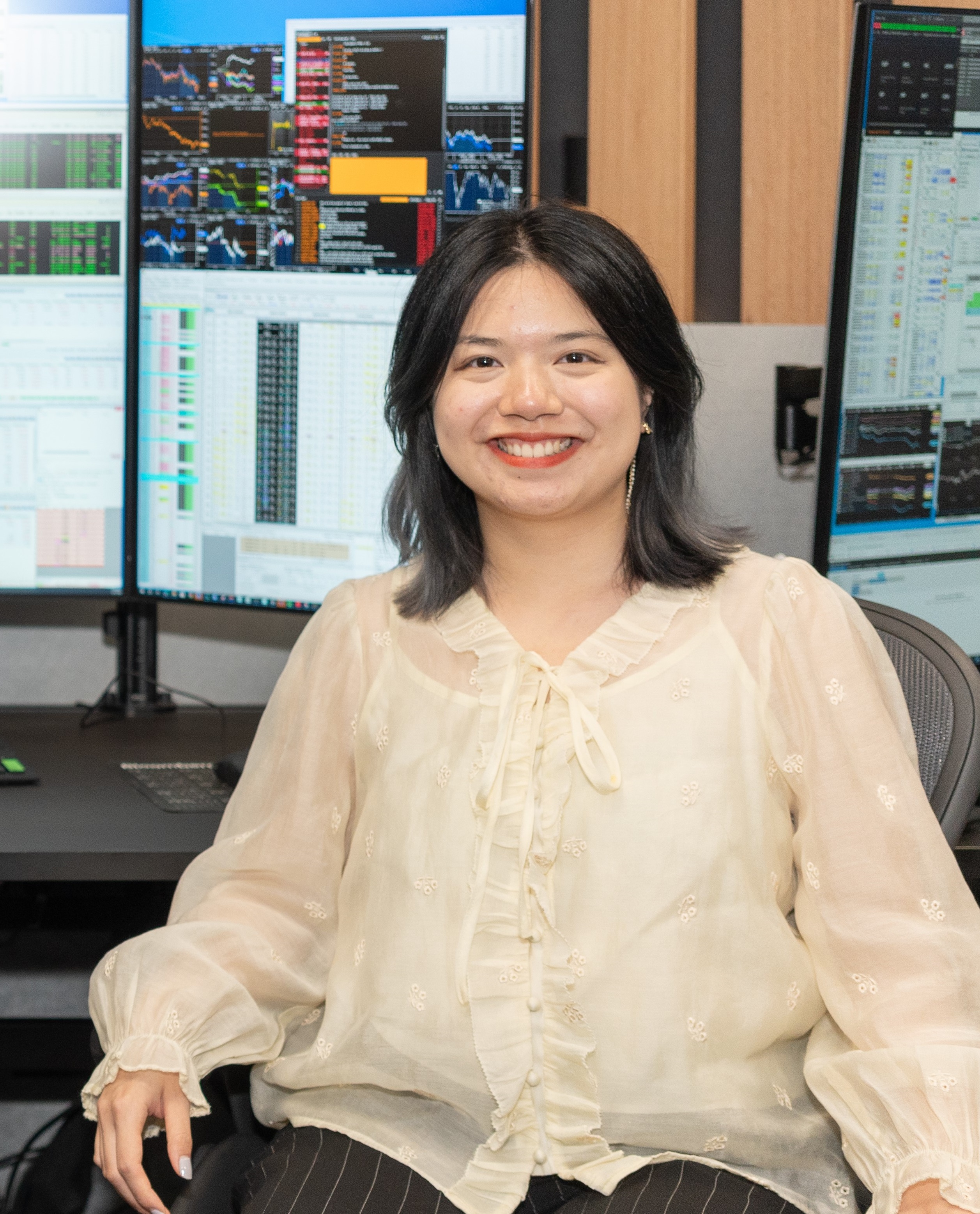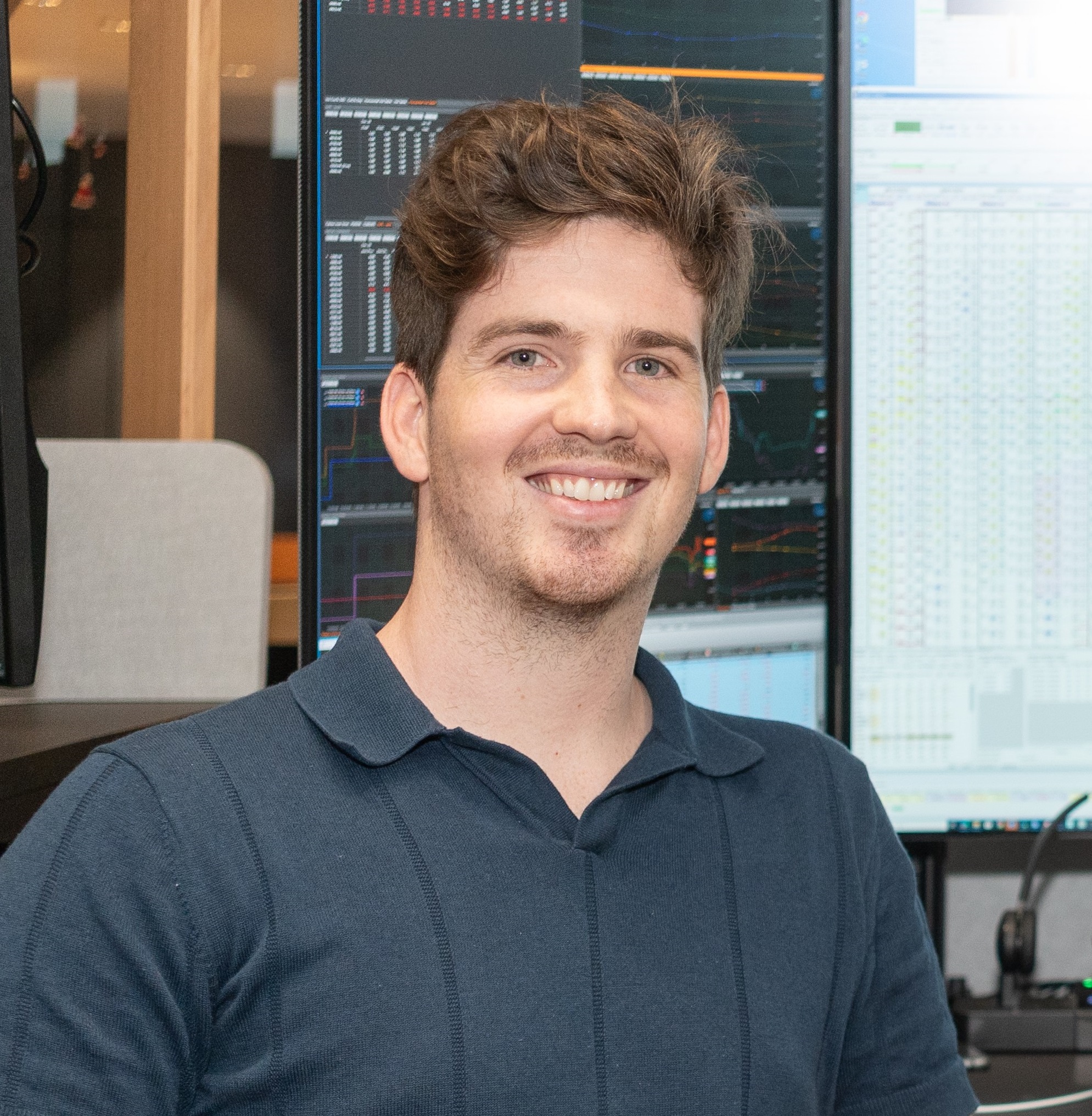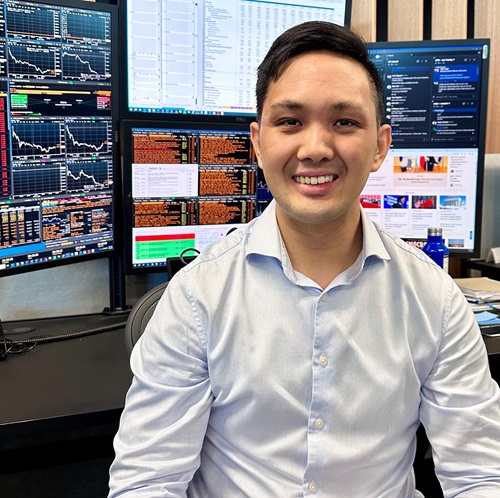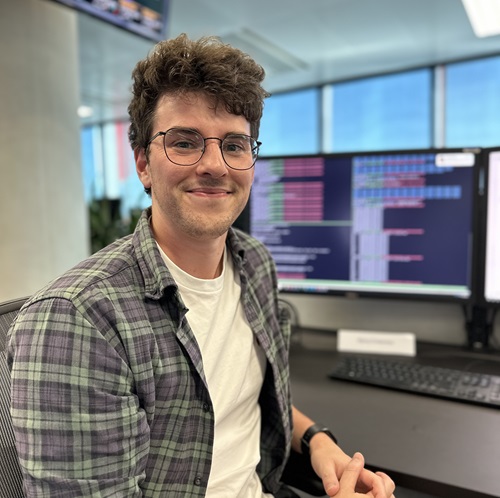Susquehanna International Group
30 opportunities
Australia
1001-5,000 employees

Selina
Software Developer
What’s your background? What did you study?
I graduated with a Bachelor of Computer Science from University of New South Wales.
What sparked your interest in working for a trading firm over a technology firm?
Generally speaking, the feedback loops are much faster here and there is more flexibility when deciding which projects to work on. I applied to various tech firms for graduate roles. During the interview processes, I asked them what impact I could make as well as what the software development cycle will be like. According to what they said, it may take weeks, even months to deploy and rollout a new feature, since features may require multiple rounds of feedback and tweaks. In comparison, efficiency and speed have much more significance at a trading firm. Once we understand the requirements from the traders or other stakeholders, we design and deploy the features into a pilot environment and get feedback from them.
Tell us about your experience in the Graduate Software Developer Program?
On the graduate program you immediately work on a project that provides value to the business. This means from very early on you get to see the impact of your work. My project was to create a chat bot that would respond to urgent alerts by posting them to the relevant user group.
I have been assigned a senior software developer as my mentor who supports me around the goals I want to achieve in my career. They also guide me through internal systems and my day-to-day tasks and projects. In addition, all the team members are friendly and willing to answer my questions. What’s more, there are technical talks to introduce each team’s high-level software architecture.
Tell us about a typical day for you?
I normally arrive in the office around 8:30 a.m., and I will check emails to ensure I keep an eye on the urgent events and the schedule I am going to work on for today. This may include any feedback on recent pilot releases. As we run a highly iterative development lifecycle there are often tight loops of user feedback and changes.
Then, I will grab breakfast in the kitchen. Susquehanna provides a variety of breakfast, including yogurt/fruit salads, and more. Since morning is the most efficient time for me, I will normally spend most of the morning writing code/debugging/testing. I will prioritise the tasks that need to be tested when the market is open.
Around 12:30 p.m., I will have lunch with my colleagues and then go for a short walk near the Barangaroo Reserve. In the afternoon, I will continue debugging/testing. We also do daily checks of our systems to make sure everything is performing as expected and I set off for home around 5:20 p.m..
How would you describe the growth you’ve seen in your time at Susquehanna?
My growth here is steady and fast. I started from working on a small project and I’m gradually getting more familiar with the whole development cycle. Now I am responsible for a larger-scale project and am more involved in the system design. I am improving on talking to multiple stakeholders to understand their requirements. I am also taking care of applications in production, so I am beginning to understand use cases that I have never thought about before which happen in production.
What do you like best about working at Susquehanna?
Definitely the working culture! Everyone here is super friendly and super willing to help. There is not too much hierarchy here and people are easy to reach out to. I have found the people at Susquehanna really friendly and willing to listen to my questions patiently. There is also more exposure to the whole internal system, compared to my internship experience with another firm, and I can get more mentorship from people around me. Also, we attach a lot of significance to work life balance here at Susquehanna.
What projects and experiences have been most rewarding so far?
I was given a project which I was working on with support from my mentor. The application was firstly used by only a small range of users within our team. After several iterations and discussing with other teams, the application is now used across different teams. The most rewarding experience from it was the ability to carry out the project independently. Starting from proof of concepts and collecting feedback from the stakeholders. Then, fully implement the applications meeting the users’ requirements and collecting feedback again.
What three pieces of advice would you give to a graduate interviewing at Susquehanna?
My most important piece of advice is to be yourself. Showing who you really are in the interview is crucial, as the interviewers are your future teammates Second, polish your technical skills. When interviewing for a graduate software engineer role, it is important to show solid understanding of technical knowledge and system design skills. Last, show enthusiasm and interest in the company as well as trading by asking some insightful questions.

Joseph
Quantitative Trader
What’s your background? What did you study?
I studied Maths and Finance at the University of Sydney.
What inspired you to pursue trading?
I have a university background and interest in both maths and finance, and trading presented a great opportunity to work in a fast-paced environment and a field that applied both.
What is your favourite thing about Susquehanna?
I enjoy the entrepreneurial approach to trading at Susquehanna. Traders are encouraged to come up with their own ideas and are helped to execute and evaluate them afterwards.
Additionally, Susquehanna’s focus on the decision-making process and decision science when evaluating trading is very refreshing; it minimises the luck from trading when assessing decisions.
Finally, good communication is beneficial, there is a lot of benefit to being able to clearly communicate your decision process as well as understanding and react to feedback on the fly.
What does a typical day look like at Susquehanna?
I start my day looking through overnight news alerts and emails from our Equity Research team, with a call one hour before trading with the team to discuss desk-specific events in more detail and do any project work I have.
From there I would look at market moves in the US and Europe and discuss any trading situations we have on the day with the rest of the desk.
Once the market opens, I am focussed on trading, and we use the HK market lunch break to flag any situations arising and gameplan for the post-lunch session.
After the close, we will have a desk huddle and recap our trading day to send to the rest of the firm.
Are there any specific skills or qualities that are essential to succeed at trading?
Trading allows for you to both showcase and capitalise on a wide range of skills. You will need a solid knowledge base in maths, including probability and distributions, plus an ability to quickly assess situations. Experience in competitive environments like sports or strategy games, can help an individual thrive in the fast-paced world of trading.
Furthermore, being generally inquisitive and enjoying assessing and solving complex problems is valuable, as well as an entrepreneurial mindset and an ability to lead projects.
How do you handle the stress of high stakes trading in your job?
While expectations are high at Susquehanna and trading can be stressful by nature, the office culture is supportive rather than piling on pressure to perform.
I find keeping active helps me to relax as well, rock climbing and golf are my sports of choice.
What does typical career progression look like at Susquehanna?
The trading intake starts with 6 months on-desk in Sydney, where you will learn about basic options and trading theory. From there you will join other Quantitative Traders at Susquehanna’s US headquarters for 8-12 months, where you will further your trading education, culminating in Susquehanna’s 10-week trading class. You would then be a junior trader and assigned to a desk.

Tom
Equity Research Analyst
What’s your background, what did you study?
I majored in Finance and Economics at university. I’ve worked at Susquehanna for about a year now and have really enjoyed the experience so far!
What sparked your interest in working for a trading firm?
While I was in university, I competed in a lot of stock pitch and business case competitions. I really loved the thrill of competition, the sense of camaraderie, and the process of working in a team to solve complex problems. While I wasn’t sure of the exact career I wanted to pursue, I knew that I wanted to go into a role with those kinds of attributes. When I found out about the type of work in a trading firm, it felt like a great fit for my interests: the fast-paced nature of the work, the collaborative environment, the quick feedback loops, and the interesting problems all really appealed to me.
Tell us about your experience in the equity research program.
The Equity Research Analyst role is all about helping our traders gain an advantage in the markets. We do this in a few ways such as recommending trades on breaking news, determining how information is disseminated, and providing valuation and analysis on situations in the markets. We try to understand what factors are driving price movements and ensure that our opinions are reflected in products that we trade, particularly in options. The program starts off with an education program that covers options theory before working on the desks on research projects and later getting assigned a coverage area of stocks.
Tell us about a typical day for you.
In the morning when I get to the office, I’ll first catch up on the overnight news flow and send a recap of any impactful news to traders. Before the market opens, we have a discussion on the desk to discuss potential trading ideas that we can action.
When the market opens, I’ll actively monitor headlines for breaking news that can impact products we trade, as well as respond to any questions traders might come have. Sometimes, a piece of news will break, and we’ll work quickly to understand its implications and act on potential trading opportunities.
When the market is quieter, I’ll work on projects such as preparing for future events like an earnings announcement or potential catalysts that can affect a company. After the market closes, we’ll reflect on any situations that played out during the day and send out a recap to analysts and traders in our other offices.
Are there any skills or qualities that are essential to succeed in Research at Susquehanna?
The key qualities essential to succeeding in research at Susquehanna include a strong interest in the markets, the ability to think about problems critically, as well as being curious. It’s also important to be able to learn from mistakes. There will always be times where we miss out on an opportunity, or a trading opinion doesn’t play out as expected, so being able to reflect on how to improve for the future is important.
How would you describe the growth you’ve seen during your time at Susquehanna?
Growth has been quite fast and I continue to learn every day. Research Analysts at Susquehanna are given quite a lot of responsibility from early on, and there is a lot of autonomy and flexibility to work on different projects that interest me. When I joined, I wanted to learn about a lot of different products across many markets, and within my first few months, I was able to work on projects spanning the commodities space, Australia and Hong Kong option strategies, Japanese and Korean equities, and macroeconomic projects. I currently cover equities in the Asia-Pacific region, and really like the fact I can learn about a lot of different industries.
What do you like best about working at Susquehanna?
The culture. People at Susquehanna have a great sense of humour which makes the experience of working here a lot of fun. Susquehanna also has a flat structure, there are no formal titles, and people are very friendly. You can reach out to anyone, and they will be willing to help you.
What projects and experiences have been most rewarding so far?
I think the most rewarding experiences are the ones that involve analysing a complex trading situation and recommending a trade that works out well. Every situation is different, and it’s always rewarding to see your decisions play out accurately in real time.
What three pieces of advice would you give to a graduate interviewing at Susquehanna?
1: Keep up to date with what’s going on in the markets – whether it’s through investing in your own account, following news on your favourite companies, or reading news and seeing how it impacts the market.
2: Be inquisitive. Demonstrate your ability to think critically about different pieces of information, to dig deep into problems, and to come up with insights that others might not consider.
3:Being able to get across your ideas clearly and concisely is important on a trading floor – so that’s something that is also important to demonstrate in the interview process.

Harry
Quantitative Researcher
What’s your background? What did you study?
I did a pure mathematics PhD before joining Susquehanna. My thesis was on applications of probability theory to chaotic dynamical systems. While the subject matter of my PhD is not something that I regularly use at work, the research and abstract problem-solving skills that I developed during my PhD are indispensable tools that I still use every single day.
What sparked your interest in working for a trading firm over Academia?
Trading firms have no shortage of hard research problems to solve, which is not unlike academia. However, doing research at a trading firm is much more collaborative than in academia. While you may be the expert on a particular topic in the office, you will still be in constant discussion with other researchers, traders, and technologists about your work. In contrast, I found doing a PhD to be quite isolating – mathematics is so diverse that most mathematicians only have surface level familiarity with each other’s work. Also, in an academic career one has plenty of non-research responsibilities (e.g., teaching, administrative responsibilities). Quantitative researchers at trading firms are able to spend most of their time focussing on research. Lastly, research at a trading firm has a fast and tangible impact on the business compared to the very long peer-review process in academia.
Tell us about your experience in the Graduate Quant Research Program.
I was well supported during the onboarding experience. At the very beginning, I spent a few weeks doing a course on options theory, all while participating in social events with grads and attending weekly poker lessons. Over time, I was given increasingly difficult projects, and later I was invited to visit the headquarters in Philadelphia to attend an intensive course for quantitative researchers. There I met with many senior quants from our US business, attended lectures on Susquehanna’s options trading stack, and worked through several mock studies from different business areas. Attending that course was the highlight of my first few years at Susquehanna, and the connections I made there have served me well since returning to Sydney.
Tell us about a typical day for you.
There is never a typical day! At times I can be solely focused on a single longer-term project, while on other days I will be jumping between meetings and answering ad hoc research questions from traders or investigating the performance of improvements to our strategies. Having said that, I generally start the day by trying to talk to people in the Philadelphia office while our office hours overlap. I will then dive into whatever project is my current focus - this could involve building datasets in preparation for doing a study or creating a model, interrogating data to build signals to improve our production trading strategies, or checking that a new model has been implemented correctly before it is released into production. Often, I will have to talk to traders before the markets open to discuss ongoing projects. Meetings with other quants and teams can be scattered throughout the day.
Are there any specific skills or qualities that are essential to succeed in Research at Susquehanna?
Aside from statistics and programming skills, I think good quants are thrifty, open-minded, and very curious, with a bit of a competitive streak. Our goal is to get to the truth of problems as cheaply as possible, and then to convert that truth into something tradeable – all the mentioned skills help in the pursuit of these goals.
How would you describe Susquehanna’s growth, since you joined?
The firm has big ambitions for APAC markets, and consequently the Sydney office has been growing at a rapid pace. The atmosphere in the office is one of excitement and anticipation – nobody expects the work to be easy, but everybody is raring to do their bit.
What do you like best about working at Susquehanna?
I enjoy the intensely collaborative and cross-disciplinary environment in which we do research at Susquehanna – to get to the bottom of a particular question may involve talking to traders, operations, quants, or a variety of technologists to understand how each detail impacts the strategies that we are running. The work is also very challenging, which makes success all the more rewarding.
What projects and experiences have been most rewarding so far?
I’ve worked on a few projects that started as solo ventures building a model for a specific trading need that then evolved into collaborations with tech and trading in order to implement the model and incorporate it into our trading strategies. Seeing projects evolve from a simple concept to a fully-productionised component of a profitable strategy is incredibly rewarding, and it is a great feeling to have the support of your colleagues throughout the whole process.
What three pieces of advice would you give to a graduate interviewing at Susquehanna?
1: Brush up on basic probability theory and statistics.
2: Make sure you understand some basic financial concepts. For example: how does an order book work, what is a call, what is market making and why would anybody be a market maker.
3: If you have any questions for us, make sure you ask them. We want people to comfortably be making an informed decision when joining the firm.
